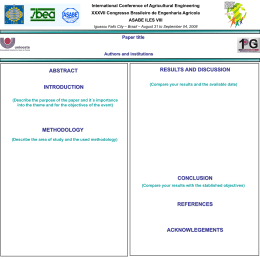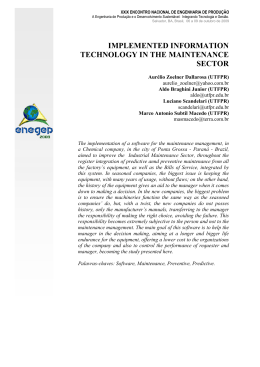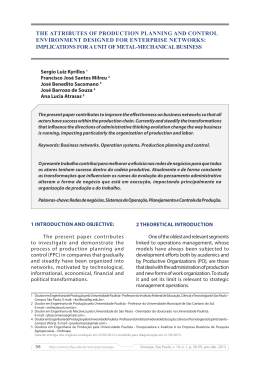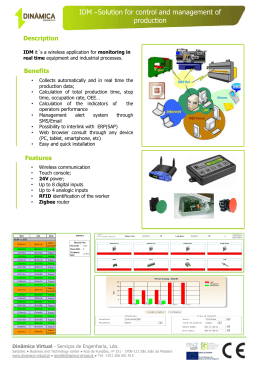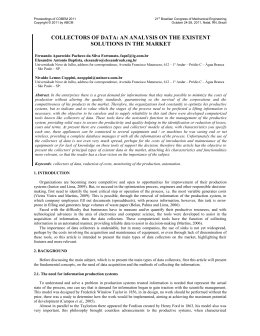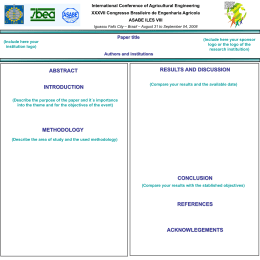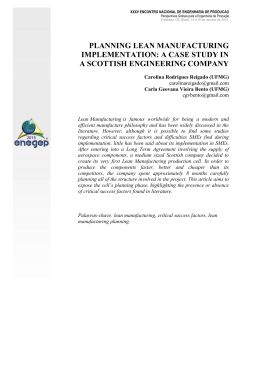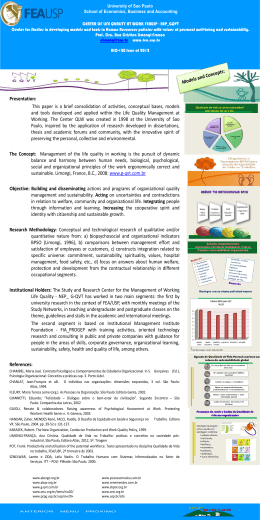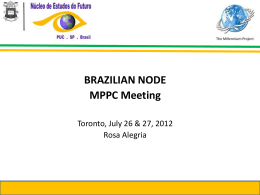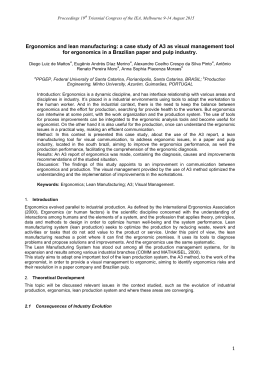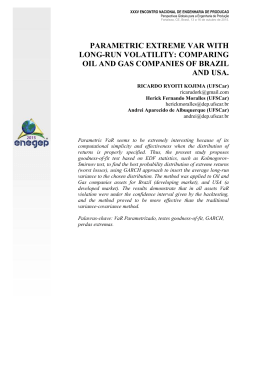OPERATIONS AND LOGISTICS MANAGEMENT – GOL Research Group: Antonio Rafael Namur Muscat 1 Dario Ikuo Miyake 2 Débora Pretti Ronconi 3 Hugo Tsugunobu Yoshida Yoshizaki 4 José Carlos Vaz 5 Marco Aurélio de Mesquita 6 Miguel Cezar Santoro 7 Paulino Graciano Francischini 8 Luiz Fernando P. Abreu 9 http://www.pro.poli.usp.br/professores/corpodocente Contact to: Miguel Cezar Santoro, [email protected], +55-11-3091-5363, http://www.poli.usp.br/pro/ About the Group: The Research Group on Operations and Logistics Management (GOL) - Ref. USP.1002 Directory of the Research Groups in Brazil (LATTES/CNPq) - has been established to develop research projects and teaching activities related to the planning and management of operations and production resources in the context of both manufacturing and service industries. Currently, the group is developing studies and projects in following major areas: mathematical models and simulation techniques to solve problems such as optimization in operations planning and scheduling, inventory planning, as well as in logistics infrastructure planning. Another feature is the concern for key issues that emerge in intervention processes at organizations that seek the implementation of more reliable, efficient, and agile operations in production systems. Support for the development of research projects under this line have been granted by governmental agencies such as FAPESP and CNPq. Moreover, a concrete outcome of the research group was the organization of a permanent forum for the discussion of the Lean Manufacturing model which has propitiated the exchange of knowledge and experience among professors, graduate students, autonomous consultants, technical professionals and executives. Indicators Bibliographical production Papers in periodicals Book chapters Other Bibliographical production Papers in conference proceedings Full 1) Production and Inventory Planning, Scheduling and Control; 2) Logistics and Supply Chain; 3) Productivity in Production and Logistic Systems. Abstracts A feature of the works deployed by the GOL members is the intensive application of Master dissertations Professor Doutor do Departamento de Engenharia de Produção – PRO 2 Professor Doutor do PRO 3 Professora Associada do PRO 4 Professor Associado do PRO 5 Professor Assistente do PRO 6 Professor Doutor do PRO 7 Professor Associado do PRO 8 Professor Doutor do PRO 9 Professor Assistente do PRO 23 3 Technical productions Congress presentations Other technical productions 12 3 Concluded supervision Phd thesis Undergraduate projects 1 10 2 3 Scientific initiation projects Supervision in progress Jury member 8 4 6 0 13 26 1. Research Projects: 1.1. Strategies and management models for operations competitiveness improvement Coordinator: Dario Ikuo Miyake Collaborators: Antonio Rafael Namur Muscat, Paulino Graciano Francischini Doctoral candidates: José Carlos Vaz The constant search for gains in competitive power has motivated the rise and development of new visions, strategies, tactics and best practices aimed at productivity and quality improvements. Impelled by such a pervasive movement new models have emerged for the design and management of manufacturing systems and supply chains. Though the diversity of new models in diffusion in these days is auspicious, in itself, it has also brought uncertainties and risks to companies in the sense that the hypothetical combined application of concepts, organizational structures and techniques derived from different prescriptive models implies advantages (complementarity, sharing, synergy) and disadvantages (redundancy, antagonism) on the other hand. The objects of study in this research project are the enablers and the barriers, of conceptual and practical nature, faced by industries developing efforts in learning and implementing new elements proposed by such models in a combined approach. Special attention has been dedicated to the investigation of the following three models: Just-in-time (JIT) production, Total Quality Management (TQM), and Total Productive Maintenance (TPM). Among the issues researched are included the potential of an integrated strategy for adopting these models in industries; the definition of criteria to assess initiatives of combined application, and the proposition of principles and guidelines for planning and conducting combined implementations. Keywords: TQM; JIT; TPM 1.2. Lean production implementation processes in Brazilian manufacturing and service industries Coordinator: Dario Ikuo Miyake, Paulino Graciano Francischini Collaborators: Alvair Torres Jr. (FEA-USP) The Lean Production model has been an object of great interest by companies in manufacturing industries that have undertaken efforts seeking the improvement of their competitiveness. Early initiatives to implement Just-in-time (JIT) production and delivery techniques in Brazilian companies date from the 1980’s. In that time, such attempts were restricted to the implementation of some specific elements such as the kanban system for inventory control or the formation of manufacturing cells; and, in many cases, the results achieved were meager and/or locally confined. After a long period of learning, some Brazilian companies seem to have mastered the necessary competences for planning and implementing effectively an integrated set of concepts and tools that make possible to convert traditional production systems into leaner systems featuring superior systemic performance. The projects that have been developed in this research front consider the following objectives: a) identification of critical success factors, b) examining the applicability of value stream mapping methodology; c) development of methodologies to support the implantation of lean production systems. A concrete outcome of this project was the organization of a permanent forum for the discussion of the Lean Manufacturing model which has propitiated the exchange of knowledge and experience among professors, graduate students, autonomous consultants, technical professionals and executives. The purpose and organization of this forum as well as a report of its activities are presented in the following web-site: http://www.geocities.com/dario_miyake/Forum_L ean Keywords: lean production, lean manufacturing, lean service, lean construction, lean thinking. 1.3. Production and Inventory Planning, Scheduling and Control Coordinator: Miguel Cezar Santoro Collaborators: Marco A. Mesquita, Débora Pretti Ronconi Research and Modeling in Production and Inventory Planning, Scheduling and Control, in different production systems - pure inventories, continuous and intermittent systems, and by project – and their interfaces with other corporate functions such as logistics, finance, sales and engineering, as well as with the supply chain. Roughly speaking, the planning activities in these enterprises consist on deciding what, how much, and when to make or to buy. This decision making process is oriented to attain the multiples and conflicting goals such as demand fulfilling, cost and time reduction in the production of goods and services, inventory reduction and optimization of capacity utilization. The main research themes are: strategic planning, aggregate planning, shop scheduling, inventory planning, line balancing, project planning and control, planning materials and other resources requirements, and so on. A feature of the projects in development under this theme is the intensive utilization of mathematic modeling and simulation to achieve optimization of the operations planning and scheduling problem. Keywords: planning, scheduling, control. 1.4. Production System Capabilities for Agile Manufacturing and Mass Customization Coordinator: Dario Ikuo Miyake Collaborators: Renato Lima Sanctis (Multibras), Cláudio Marcos Vigna As the trends of product model proliferation, product life cycle shrinking, and searching the fulfillment of the customers’ increasingly specific needs have intensified, leading manufacturing firms in different sectors have striven to develop innovations in terms of technology, organization, and methodology so as to nurture new flexibility dimensions which may enhance speed and reduce costs to coping with the variation of product mix, production ramp-up, capacity adjustment, and physical reconfiguration of production systems. The search of such enhanced flexibility and agility in manufacturing has brought initiatives that rely more on the versatility and empowerment of the workforce (production organized around networked work-cells) as well as adoption of innovations in flexible automation, applications of information technologies, supply chain practices such as postponement, adoption of modularity concepts in product development and design. The purpose of this research project is to explore how these abilities and resources should be developed and combined, to support efficiently operations strategies such as mass customization, Build-to-Order (BTO) production and Assembleto-Order (ATO) production. Keywords: Re-configurability, manufacturability, agility. Scholarships: Claudio M. Vigna (master – CNPq) 1.5. Logistics and supply chain Coordinator: Hugo Yoshizaki Collaborators: Antonio Rafael Namur Muscat, Dario Ikuo Miyake, José Geraldo Vidal Vieira, Miguel Cezar Santoro, Paulino Graciano Francischini, Patrícia Prado Belfiori Fávero. Post-graduation studensts: Danilo Campos, George Paulus Pereira Dias, Manoel Roman Filho, Enrico Ferri, Leonardo Maluta, Leonardo Pelloso, Plínio Carraro (MLOG). Logistics and supply chain deal with planning, designing, controlling, and managing the flow of materials and related information, from suppliers up to final consumers, and may include returns, recycling, or disposal of products. From a stricter point of view, logistics manages a limited number of flow stages (generally only one or two echelons of manufacturing or operations), while a supply chain considers the total flow, with several stages of transformation. Thus, in this last case, there is more focus in on relationships between different firms and partners, even allowing for financial flow and coordination matters, as well joint product design. Research projects involve interorganizational relationships (just in time, ECR – efficient consumer response), development and evaluation of suppliers (partnerships), decision support systems (Statistics, Operations Research and soft methodologies), inter and intraorganizational coordination, supply and physical distribution network design, besides traditional topics as material storage and handling, plant and warehouse layout, inventory control, maintenance management, industrial location, etc. Keywords: supply chain management, suppliers, logistics. Financial support: CNPq Scholarships: Lucas Eung Lee (IC/CNPq) 1.6. Development of heuristic methods for scheduling problems Coordinator: Débora Pretti Ronconi Collaborators: Celso M. Hino, André B. Mendes Master students: Luís Roberto S. Henrique, Claudio F. Furlan. The scheduling problem consists on the allocation of resources to tasks, respecting the imposed restrictions and optimizing one or more criteria. This is a very complex problem due its combinatorial nature, and in practice, most of these problems have a difficult resolution through methods that obtain the optimal solution. In these cases heuristic methods are usually used to find solutions not necessarily optimal, however of good quality. With special success, researchers adapted ideas of other areas to develop the metaheuristics. Given the success of the heuristics and metaheuristics in many applications, this project treats of the resolution of scheduling problems through these techniques. Keywords: combinatorial optimization, scheduling Financial support: CNPq 1.7. Minimization of earliness and tardiness penalties in scheduling problems Coordinator: Débora Pretti Ronconi Master students: Celso S. Sakuraba, Márcio S. Kawamura. In the majority of the theoretical works on scheduling, simple measures of performance have been applied, as for example the minimization of the makespan. In general these measures are criteria regular. Among these criteria we can mention measures related with tardiness, as the minimization of the total tardiness, whose difficulty is due to the fact that tardiness is not a linear function of the makespan. With passing of the years such measures have been more studied, especially in environments with multiple machines, in view of the increasing importance for the market of factors as the determination and the fulfillment of of customer orders on time. Moreover, diverse papers on scheduling have considered penalties for earliness in addition to penalties for tardiness. This trend is due to the propagation of the philosophy Just In Time (JIT) in the industries. Given the success of the heuristics and metaheuristics in many applications, this project treats of the resolution of scheduling problems through these techniques. This project deals with two topics: (i) development of heuristics for flowshop scheduling problem with two machines to minimize the mean absolute deviation of a common due date, and (II) development of a branch-and-bound algorithm for the resolution of a single machine scheduling problem to minimize the sum of earliness and tardiness of the jobs. Keywords: combinatorial optimization, scheduling Financial support:CNPq/FAPESP Scholarships: Celso S. Sakuraba (master - CNPq) 1.8. Theory and practice of cutting and packing problems Coordinator: Marcos Arenales Collaborators: Débora Pretti Ronconi, Reinaldo Morabíto, Paulo M. França, Vitória Pureza, Antônio Carlos Moretti, Horácio Yanasse e outros pesquisadores do estado de São Paulo. The main objective in this project is the study of theoretical as well as practical aspects of Cutting and Packing Problems (CCP). Basically, the cutting problem consists of determining the best way of cutting units of material (hereafter denominated objects), in order to produce a set of smaller units (items). Similarly to the cutting problem, the packing problem consists of determining the best way to arrange items into the objects. By theoretical aspects we mean the modeling of the problem, the development of solution methods, the identification of properties, the review/survey of the literature, and computational analysis. The practical aspects, besides including the phases of the theoretical part, are motivated by industrial applications, and consider data collection, model validation in practice, and development of user-friendly computational tools. The aim of the present project is to integrate new research groups in this topic, exchanging different experiences and knowledge in order to produce high standard research, due to group synergy. Keywords: optimization, cutting and packing Financial support: FAPESP 1.9. Discrete Optimization and Graphs: Theory, Algorithms and Applications Coordinator: Yoshiko Wakabayashi Collaborators: Débora Pretti Ronconi, Abílio Lucena, Jayme Szwarcfiter, Celso C. Ribeiro, Andres Weintraub, Cristina G. Fernandes e outros pesquisadores do Brasil, Chile, Uruguai e Argentina. In this project we plan to develop new approaches and algorithms to solve hard combinatorial optimization problems. Many of these problems have important applications in practice. For instance, many problems that arise in the design of VLSI circuits can be formulated as combinatorial optimization problems. We are specially interested in packing problems. Such problems have been broadly investigated not only because of their interesting theoretical aspects, but also due to their many practical applications, such as in cloth, glass, paper and wood industries and newspapers paging. We intend to develop new algorithms for a variety of packing problems. All participants have ongoing experience on this subject, and this project is a natural attempt to combine their skills to solve new hard problems. Keywords: optimization, cutting and packing Financial support: CNPq (Prosul) 1.10 Simulation for Production System Design and Operation Coordinator: Marco Aurélio de Mesquita. Collaborators: Miguel Cezar Santoro Simulation involves the development of descriptive compute models of a system and, through the intelligent use of those models, to predict the operational performance of the underlying system being modeled. This research project focuses on the application of simulation methodology to manufacturing system design and operation. More specifically, system design deal with facility layout and system capacity/configuration. System operation, on the other hand, includes decision making on operations planning and scheduling. In a addition to the facility analysis, the Simulation approach is powerful tool for the analysis and performance evaluation of the entire supply chain. The Simulation, which belongs to the traditional field of Operations Research and Production Engineering, is now being recovered at the Production Engineering Department. The opening initiatives were the implementation of a simulation laboratory and the reformulation of the undergraduate discipline. The next steps will be the more specific research projects deployment and the offering of a new graduate discipline on the subject. Keywords: simulation, production systems, supply chain 2. Relevant Works 2.1. Articles in periodicals MUSCAT, A. R. N. ; BIAZZI, M. R. ; MIGUEL, P. A. C. . Implementação da estratégia utilizando BSC: um estudo de caso no setor público brasileiro. GEPROS Gestão da Produção, Operações e Sistemas, v. 3, p. 35-47, 2007. TAKEY, F. M.; MESQUITA, M. A. . Aggregate Planning for a Large Food Manufacturer with High Seasonal Demand. Brazilian Journal of Operations and Production Management, v. 3, p. 5-20, 2006. CAMPOS, G. G.; YOSHIZAKI, H. T. Y.; BELFIORI, P.P. Algoritimo Genético e Computação Paralela para Problemas de Roteirização de Veiculos com Janelas de Tempo e Entregas Fracionadas. Gestão e Produção (UFSCar), v. 13, p. 271-281, 2006. BELFIORI, P.P.; YOSHIZAKI, H. T. Y. Scatter search para problemas de roteirização de veículos com frota heterogênea, janelas de tempo e entregas fracionadas. Produção (São Paulo), v. 16, p. 455-469, 2006. KAWAMURA, M.S., RONCONI D.P. & YOSHIZAKI H., 2006, Optimizing Transportation and Storage of Final Products in the Sugar and Ethanol Industry: a case study, International Transactions Research, 13, pp. 425-439. in Operational BIRGIN, E.G., MARTÍNEZ, J.M., NISHIHARA F.H. & RONCONI, D.P., 2006, Orthogonal Packing of Rectangular Items within Arbitrary Convex Regions by Nonlinear Optimization, Computers & Operations Research, 33, pp. 35353548. BIRGIN E.G., MARTÍNEZ J.M., MASCARENHAS W.F. & RONCONI D.P., 2006, Method of Sentinels for Packing Objects whitin Arbitrary Regions, Journal of the Operational Research Society, 57, pp. 735-746. MIYAKE, D.I.; NAKANO, D. Implementation of Corporate Production Systems in the Brazilian Auto Industry: Managing Knowledge Through Practice. International Journal of Automotive Technology and Management, v.7, pp. 153-167, 2007. MIYAKE, D.I. The shift from belt conveyor line to work-cell based assembly systems to cope with increasing demand variation in Japanese industries. International Journal of Automotive Technology and Management, v.6, pp. 419-439, 2006. VIGNA, C.M.; MIYAKE, D.I. Capacitação do processo produtivo em uma empresa de alta tecnologia para a customização em massa. Gestão da Produção, Operações e Sistemas - GEPROS, v.1, p. 23-35, 2006. 2.2. Book chapters MIYAKE, D.I.; FRANCISCHINI, P.G.; GIANNINI, R. Exploring Operational Excellence Improvement Approaches Derived from the Lean Production Paradigm in Service Operations. In: E. Mrudula. (Org.). Lean Management- Concepts and Industry Perspectives. 1 ed. Hyderabad: Icfai University Press, 2007, pp. 143-163. MIYAKE, D.I.; RAMOS, A.W. Lean Six Sigma Brazilian Experience. In: E. Mrudula. (Org.). Lean Six Sigma: An Introduction. 1 ed. Hyderabad: Icfai University Press, 2007, pp. 156-181. 2.3. Full Papers Published in International Conference Proceedings MIYAKE, D.I.; TORRES JR., A.S.; FAVARO, C. Supply chain mapping initiatives in Brazil: challenges and opportunities. In: International Conference on Production Research, 2007, Valparaiso. 19th International Conference on Production Research - The development of collaborative production and service systems in emergent economies. Valparaiso, Chile: Pontifical Catholic University of Valparaiso, University of Santiago, 2007. p. 1-6 MIYAKE, D.I. The deployment of corporate production systems in auto-industry firms: A means to drive process improvements towards operational excellence. In: Gerpisa International Colloquium, 2007, Paris. 15th GERPISA International Colloquium on line. Evry Cedex: Université d'Evry-Val d'Essonne, 2007. p. 1-17. SANTORO, M. C., FREIRE G., Álvaro Eusébio Hernandez Inventory Models Comparison in Variable Demand Environments In: 19th International Conference on Production Research, Valparaiso, Chile, 2007. SANTORO, M. C., FREIRE G. - Inventory System to Healthcare & Medical 6th International Conference on the Management of Healthcare & Medical Technology - Scuola Superiore Sant’Anna, Pisa, Italy, 2007. SANTORO, M. C., MESQUITA, M.A. - A Strategic Approach to Industrial Engineering Curriculum in Brazilian Private Schools In: ICEE 2007 International Conference on Engineering Education, Coimbra, Portugal, 2007. FREIRE G., SANTORO, M. C.: Inventory Model Comparative Study in a Variable Demand Forecast Error Environment In: 14th International Symposium on Inventories, Budapest, República Tcheca, International Society for Inventory Research, 2006. VIGNA, C.M.; MIYAKE, D.I. A conceptual framework for mass customization systems from a capability building viewpoint. In: Third International Conference on Production Research – Americas’ Region, 2006, Curitiba. Third International Conference on Production Research – Americas’ Region. Curitiba: PUC do Paraná, 2006. p. 1-14 MIYAKE, D.I.; SANCTIS, R.L.; BANCI, F.S. The declining attractiveness of belt conveyor utilization in assembling operations and the trend of its replacement by work cell-based assembly systems: The case of a consumer electric products manufacturer in Brazil. In: Third International Conference on Production Research – Americas’ Region, 2006, Curitiba. Third International Conference on Production Research – Americas’ Region. Curitiba: PUC do Paraná, 2006. p. 1-16. MIYAKE, D.I. Enhancing responsiveness to market by the development of rapidly reconfigurable production systems: the case of a Japanese manufacturer of automotive components. In: Fourteenth GERPISA International Colloquium, 2006, Paris. Fourteenth GERPISA International Colloquium - Are automobile firms market-oriented organisations? Evry Cedex, Bordeaux: Université d’Evry-Val d’Essonne, University of Montesquieu, 2006. p. 1-18. 2.4. Full Papers Published Conference Proceedings in National RONCONI, D.P., SAKURABA, C.S. & SOURD, F., 2007, Minimization of the Mean Absolute Deviation from a Common Due Date in a Twomachine Flowshop, Anais do XXXIX Simpósio Brasileiro de Pesquisa Operacional, Fortaleza/CE. KAWAMURA, M.S. & RONCONI D.P., 2006, Aplicação do Método Branch-and-Bound na Programação de tarefas em uma Única Máquina com Data de Entrega Comum sob Penalidades de Adiantamente e Atraso, XXVI ENEGEP Encontro Nacional de Engenharia de Produção, Fortaleza, CE. BELFIORE P., SILVA V.F. & RONCONI, D. P., 2006, Scatter Search para programação de tarefas em uma única máquina com penalidades de adiantamento e atraso e data de entrega comum., XXVI Encontro Nacional de Engenharia de Produção, Fortaleza,CE. BUSSO, C.M.; MIYAKE, D.I. Estratégias de Implementação Lean Six Sigma. In: Encontro Nacional de Engenharia de Produção, 2007, Foz do Iguaçu. Anais do Encontro Nacional de Engenharia de Produção, 2007. KEMPENICH, S.; MIYAKE, D.I. Os princípios da produção enxuta e a distribuição de gás natural. In: XIV SIMPEP, 2007, Bauru. Anais do X!V SIMPEP. Bauru: Faculdade de Engenharia de Bauru, UNESP, 2007. p. 1-12. GRAMANI, M.C.N.., SANTORO, M. C.: Problema de Balanceamento de Linhas: Modelagem e Abordagem de Solução In: XXXVIII SBPO - Simpósio Brasileiro de Pesquisa Operacional, Goiânia, Brasil, 2006. MIYAKE, D.I.; MONTOYA, C.V.; MELCHERT, E.R. Planejamento do processo de implantação do sistema Lean utilizando a Análise Hierárquica do Processo (AHP): Um estudo de caso. In: IX Simpósio de Administração da Produção, Logística e Operações Industriais, 2006, São Paulo. Anais do IX Simpósio de Administração da Produção, Logística e Operações Industriais, 2006. p. 1-22. FONSECA, A.V.M.; MIYAKE, D.I. Uma análise sobre o Ciclo PDCA como um método para solução de problemas da qualidade. In: XXVI Encontro Nacional de Engenharia de Produção, 2006, Fortaleza. Anais XXVI Encontro Nacional de Engenharia de Produção. Fortaleza: ABEPRO, 2006. p. 1-9. FONSECA, A.V.M.; MIYAKE, D. I. Formas de classificação para as técnicas e ferramentas da qualidade. In: XXVI Encontro Nacional de Engenharia de Produção, 2006, Fortaleza. Anais do XXVI Encontro Nacional de Engenharia de Produção. Fortaleza: ABEPRO, 2006. p. 1-9. FRANCISCHINI, P.G.; MIYAKE, D.I.; GIANNINI, R. Adaptação de conceitos de melhorias operacionais provenientes do Lean Production em operações de serviços. In: XXVI Encontro Nacional de Engenharia de Produção, 2006, Fortaleza. Anais do XXVI Encontro Nacional de Engenharia de Produção. Fortaleza: ABEPRO, 2006. p. 1-9. Produção)) - Universidade de São Paulo. PACHECO, R.F., SANTORO, M. C.: Modelagem e Implementação Computacional do Problema de Rotação de Pastagens In: XXXIX SBPO - Simpósio Brasileiro de Pesquisa Operacional, Fortaleza, Brasil, 2007. PROTO, L.O.Z.. Um Modelo de Planejamento Agregado da Produção e Distribuição, com Múltiplas Localidades e Produção em Dois Estágios. 2006. 140 f. Dissertação (Mestrado em Engenharia de Produção) - Escola Politécnica da USP - Depto de Engenharia de Produção. SU CONNIE., SANTORO, M. C.: Gerenciamento do Risco de Prazo em Projetos In: ENEGEP Encontro Nacional de Engenharia de Produção, Fortaleza, Brasil, 2006. TORRES JÚNIOR, N.; MIYAKE, D.I.; PEREIRA, C.C.P. Proposta de um modelo de referência para a descrição do processo de desenvolvimento de serviços. In: XIII Simpósio de Engenharia de Produção, 2006, Bauru. ANAIS XIII SIMPEP - 2006. Bauru: Unesp, FEB, Departamento de Engenharia de Produção, 2006. p. 1-12. 3. PhD thesis & Master dissertations 3.1. PhD thesis TORRES JÚNIOR, N. Operações em serviços de resultados ulteriores: diretrizes gerenciais para um melhor desempenho. 2007. Tese (Doutorado em Engenharia de Produção) - Universidade de São Paulo. MENDES, A. B. Programação de Frota de Apoio a Operações Offshore sujeita à Requisição de Múltiplas Embarcações para uma mesma Tarefa. 2007. Tese (Doutorado em Engenharia Naval e Oceânica) - Escola Politécnica da Universidade de São Paulo, Co-Orientação. VIEIRA, J.G.V.. Avaliação do estado de colaboração logística entre indústria de bens de consumo e redes de varejo supermercadista. 2006. Tese (Doutorado em Engenharia (Engenharia de Produção)) - Universidade de São Paulo, Coordenação de Aperfeiçoamento de Pessoal de Nível Superior. BELFIORI P.P. Scatter Search para problemas de roteirização de veículos com frota heterogênea, janelas de tempo e entregas fracionadas. 2006. Tese (Doutorado em Engenharia (Engenharia de 3.2. Master dissertations DA SILVA, M.B. Otimização de redes de distribuição física considerando incentivo fiscal baseado no crédito presumido de ICMS. 2007. Dissertação (Mestrado em Engenharia de Sistemas Logísticos) - Universidade de São Paulo. KAWAMURA M.S. Aplicação do Método branch-and-bound na programação de tarefas em uma única máquina com data de entrega comum sob penalidades de adiantamento e atraso. Departamento de Engenharia de Produção. Escola Politécnica da Universidade de São Paulo, 2006. SAKURABA C.S. Minimização dos Desvios Absolutos com Data de Entrega Comum no Ambiente Flowshop com Duas Máquinas. Departamento de Engenharia de Produção. Escola Politécnica da Universidade de São Paulo, 2006. VIGNA. C.M. Capacitação das operações internas para a customização em massa: estudos de casos nas indústrias brasileiras. 2007. Dissertação (Mestrado em Engenharia de Produção) - Universidade de São Paulo. Bolsa: Conselho Nacional de Desenvolvimento Científico e Tecnológico. FREIRE, G. Estudo comparativo de modelos de estoques num ambiente com previsibilidade variável de demanda. 2007. Dissertação (Mestrado em Engenharia de Produção) - Escola Politécnica da Universidade de São Paulo. CARVALHO, J.D. Definição do Modal de Transporte Ótimo para Componenetes Comprados Numa Empresa Aeronáutica. 2006. 90 f. Dissertação (Mestrado em Engenharia de Produção) - Escola Politécnica da Universidade de São Paulo. COSTA, D.L.P. Estratégia de Supply Chain Management para a Manga destinada ao Mercado Externo. 2006. 160 f. Dissertação (Mestrado em Engenharia de Sistemas Logísticos) - Escola Politécnica da Universidade de São Paulo.
Download
